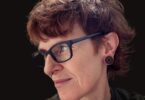In the copy room, the machines drowned Anna out. The whirs of the photocopiers bounced between the concrete walls, their humming somehow as harsh as the fluorescent lights, halting any conversation that might begin even if just between one part of the mind and another. Professor Anderson walked in, asked Anna how she was, asked how Sof was. Anna nodded her head, tightly smiled, and pointed to her ears like Good how are you, I can’t really hear you, sorry. She then moved her body to block Professor Anderson from seeing the papers being fed out onto the tray.
◊ ◊ ◊
Her mother likes to tell her, Anna was nine years old when she declared that she would be looking for employment. They were driving into The City from Town, the town in which Anna was born and raised, to go to the biggest mall in the world, and Anna told her mother she had picked up an application to work at Big’s Burgers. Her older brother said that eating meat was morally reprehensible and that Anna should avoid selling out at all costs. Anna doesn’t remember this but when she took Sof home to meet her parents, the two of them found her application. It was filled out and folded up in a drawer. Her handwriting was plump, almost too big for the spaces on the form and there were iridescent butterfly stickers in the margins. Sof said it was adorable and so like Anna and then took a picture of the creased-up document.
This fact from the past and the way it surfaced in hard copy was the kind of thing that made Anna feel like she was looking at a mall map and couldn’t find the “you are here” icon. The scene in the car with her brother was gone from her memory like a note slid under a locked door. It was just another thing someone else told her about herself. In her childhood bedroom, old dolls and stuffed animals were piled on the dresser that was full of things that are hard to throw away. Elementary school yearbooks, hand-written notes with innocently lewd messages, honour roll certificates—the kind of artefacts that suggested a high-achieving student, well-liked by her peers, and pleasing to teachers. Sof held up the application as if it were an accomplishment. Anna stared at the B’s of the logo realizing she couldn’t remember the last time she wanted something so badly.
◊ ◊ ◊
Professor Anderson met Sof at a wine and cheese, an event Anna had insisted that Sof attend though it was meant to be just for students. Since then, whenever he saw Anna he asked about Sof. Anna thought it was friendly small talk. It sounded like a rehearsed script from which he didn’t know how to deviate, as if he would ask the same way if Sof were a dog or a child or an imaginary friend. Professor Anderson rumbled something up in Anna. He looked like a teacher from her high school. The teacher was someone who in their town was whispered to be gay, but was just a man who liked to wear ascots every day and spend too much time with the girls in his grade twelve drama class after rehearsal.
The first time Professor Anderson invited Anna and Sof over for dinner, he actually invited Anna’s classmate who also had long black hair always tied into a low bun. He looked Other-Anna in the eye and thanked her for her great work as his TA that semester. Other-Anna’s face became a question mark, and she turned to look over her shoulder at Anna who was on a stiff couch behind them eating a falafel pita that was dripping sauce onto her lap. His gaze shifted, his eyes refocused. He massaged his shiny chin while offering an apology and the assertion that it must happen all the time. After he left, Other-Anna said that Professor Anderson’s wife was rumoured to be bisexual, and that they had an open relationship. “Good instinct to decline,” Other-Anna said.
About a year later, Anna finished her thesis, which culminated in a series of collages inspired by a collection of essays titled Shakesqueer. Her work barely met the requirements for passing but it didn’t matter. Anna had decided that she didn’t know what she was, but she was one thousand percent not-an-artist and it was rather incredible that she had faked it for so long. A few months later, one of the Administrative Student Affairs Coordinators in the department retired, and Anna applied for the job. When she interviewed, the HR person smiled and said, “you’re going to be very good at this, I can tell.”
◊ ◊ ◊
At fourteen, Anna convinced her boyfriend, Zac Adamovich, to ask his mother to hire her to work at her small shop, Gifts Etc. To Mrs. Adamovich, Anna’s insistence demonstrated that Anna was a smart girl, a good influence. The next Saturday afternoon at Gifts Etc., Anna was left alone while Mrs. Adamovich went to her office to yell at Zac for breaking curfew. Not knowing what else to do with the sounds of parental disappointment mixed with the soft classical music renditions of pop songs playing in the store, Anna put together a gift basket. Cappuccino scented candles, cinnamon scented potpourri, raspberry and vanilla scented lip balms, two tiny pots of apricot jam, and two coffee mugs. Classy, she thought and imagined a man bringing her breakfast in bed. Zac stormed out and Mrs. Adamovich came back as if she had just gone to the bathroom, embarrassed about doing a number two. She deflected with enthusiasm for Anna’s gift basket. She was so impressed that she began introducing Anna to customers as her gift basket specialist. Occasionally Anna remembers this, and she involuntarily smiles and then shudders the smile away.
Zac had dropped her off the night before and not gone home. They were walking around town aimlessly and when her house was in sight, she told Zac she thought she had a crush on their classmate Faith. He was smoking a joint and she was pretending that her breath freezing in the air was smoke too.
In another version of her life, Anna became Mrs. Adamovich’s daughter-in-law and took over Gifts Etc., eventually renaming it The Perfect Gift. There were days when this seemed to be a real possibility as Zac did not seem bothered by Anna’s feelings for Faith, which she dutifully ignored. There was no adult in her life that was not impressed with her dedication to part-time work, and school, and the drama club. They would often suggest that maybe one day the store would be hers. Mrs. Adamovich accepted this with a smile, and Anna once overheard her say, “I know!” when Mrs. Denis said that that Asian girl and Zac would have beautiful children.
By then Anna’s brother was long gone so there was no comment to forget about what he would have said about Gifts Etc. He went all the way from their landlocked farm town to the California coast to “putz around,” as the town said. Anna was eleven years old when he left and he hadn’t come back since. Once he wrote her a letter, telling her she should find something to live for and live for it. She didn’t think to go that far, but she applied to the Fine Arts program at the university in The City. Her high school art teacher had complimented the realism of Anna’s self-portraits, and she had heard Faith mention art school once or twice. When Anna received an acceptance letter, she came up against a thought, like a paper cut, that she had not conceived of any life beyond the achievement of getting in. Although Anna submitted a portfolio showing a great range of talent in rendering realistic detail in different mediums, when she began spending time in the basement studios on campus, she found that she did not know what she was supposed to do. She resorted to big blocks of colours, hours spent adding layer after layer, bouncing her body to minimalist British punk music that made her feel like her brother was nearby. She gave her paintings titles like “Dionysus,” or “Hera,” or “Ophelia.” Anna noticed that allusions went far in crits and thought a nod to Ancient Greece here and Shakespeare there couldn’t hurt. It helped people see things in her paintings. Her classmates and professors went to great lengths to see things and name what they saw. For Anna, when she painted, she was just covering a canvas, and her intention was not to represent anything at all. She did like getting good grades though and the titles helped immensely with that.
During these years Anna worked double shifts at a Tex-Mex restaurant and stayed up late with her canvasses. She explored other mediums as was necessary, and once did a performance piece entitled “Sex ‘n’ Death.” She wore all black and pretended to tap dance while repeating the words “sex and death” for seven minutes straight. Her professor said the concept was underdeveloped, and her classmates said they thought it should go longer for it to be more effective. Life felt free of both a past and a future, full of inconsequential successes and failures. At the end of a shift at the restaurant she would eat a huge plate of nachos that the cooks let her put whatever she wanted on. Her feet ached in a way that felt necessary and satisfying. She skipped classes to work, and her boss, Gary—a long-haired, motorcycle riding, wife-described “big teddy bear”—loved her for that.
◊ ◊ ◊
The nights after her first days as Administrative Student Affairs Coordinator, Anna was flapping her arms and whimpering in her sleep. A man had cornered her in an office, next to an old metal filing cabinet, threatening to throw her in. Dream-Anna puffed up her chest and bucked at him as if she were a chicken and as if being a chicken was brave. Sof woke Anna up, holding her, saying You’re dreaming, you’re dreaming again.
On the eve of the university closing for winter break, after everyone had left, Anna did what she had been doing for several nights before. She photocopied her hands and then her shoulders. Then after haphazard experimentation with her weight on the machine she photocopied her shins and knees. She stood on a stool and photocopied the bottom of her feet one by one. She imagined setting the machine up in a prestigious New York gallery and performing this routine until the toner ran out. She would call the piece “Dream Job.” In the long evenings while Sof studied for the bar exam, Anna usually drifted in front of episode after episode of reality tv. She had developed a theory that one day the only way to earn income would be by letting people watch you do embarrassing and disgusting tasks. But as she accumulated all the paper facsimiles of her body parts night after night, she felt like she should do something with them. Sof picked up the papers and asked if Anna was going to start making art again with a little too much enthusiasm for Anna to take. But she resolved to do something with all of it. Maybe it was guilt about the growing pile of paper, maybe it was inspiration. It was hard to tell the difference.
At the end of her night at the office, before she packed up her stack of papers, Anna remembered her face. She lifted open the copier and rested her nose against the glass. She pushed the button and let the bar of greenish light swipe over her open eyes. It was warm and it stung, but Anna liked to look inside, and who hadn’t stared at a light until it hurt? She pressed the button again and again. When she stood up, she heard a voice singing. The white walls looked purple. Her eye muscles were dissonant with sight like the tones of an ambulance. The cleaner walked in, startled to find someone, and pulled out his headphones. “Sorry,” he said, “sorry,” again, “I didn’t think anyone was here.” There was a glow interrupting his body, the afterimage of the bar of light from the photocopier. For a moment, Anna thought he was an apparition and reached out to see if he was real.
T. Liem is the author of Slows: Twice (Coach House 2023), and Obits. (Coach House, 2018). Their writing has been published in Apogee, Plenitude, The Boston Review, Grain, Maisonneuve, Catapult, The Malahat Review, The Fiddlehead, and elsewhere. They live in Montreal / Tio’Tia:ke, unceded Kanien’kehá:ka territories.







